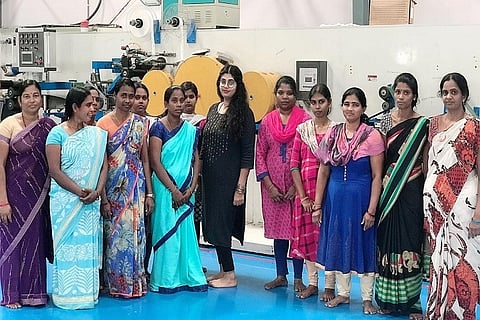

An engineer by profession and a fashion designer by passion, Rathlawat Maheshwari could have had a cosy job in any plush office in Hyderabad. Instead, she now runs a sanitary napkin manufacturing unit near Dundigal and sells a packet of pads for just Rs 18 among women in nearby villages, schools and colleges. She believes that basic utilities like sanitary pads should be easily accessible and affordable and that no woman should put her health in jeopardy by using old tattered pieces of cloth in place of napkins.
“I began the unit in March this year after I came across a napkin manufacturing unit in Nagpur. The unit had a bunch of workers who manufactured sanitary napkins using their hands. They made around 100-200 pads a day and I found the method extremely unhygienic. They used bare hands to press the cotton without even using gloves. I asked the owner why he wouldn’t mechanise the entire process of pad-making. He said the machines were very expensive and a local unit like theirs couldn’t afford to buy them. That set me thinking and I started looking up for more information on the Internet,” Maheshwari tells TNM.
The pads that Maheshwari manufactures today are organic. While most of the branded napkins we use take several years to decompose, the unit utilises oxo-biodegradable additives that decompose plastic within six months of coming in contact with soil.
“Oxo-biodegradable plastic degrades just like nature’s waste. It doesn’t leave any toxic residue or fragments of plastic behind. While normal napkins use plastic that takes years to decompose, posing environmental risks, oxo-degradable ones, unlike conventional plastic, is a lot safer to use,” Maheshwari explains.
Maheshwari has around 30 workers, all women, working at her manufacturing unit in Dundigal, in the outskirts of Hyderabad. The entire process is mechanised while the women help in packing and parcelling the product. The manufacturing machine, procured from China, simplifies the process of making napkins, producing around 2 lakh pieces a day.
For many, the idea of making sanitary napkins, and that too with a woman helming the process, seemed ridiculous until Maheshwari successfully installed the machine in March this year.
“It was during an event that I came across a woman from China who was exhibiting the machine. I got in touch with her and she invited me to her country to learn more about the product. The expenses were huge and I applied for a bank loan. The banks shuttled me from one place to another because for most managers, the business idea seemed like a joke. Many of them would start rolling their eyes or give casual smirks when I would tell them about sanitary napkins. The stigma around the entire issue of menstrual hygiene was a barrier I had to wade through before setting up the unit,” Maheshwari says.
After setting up the unit, Maheshwari’s next task was to educate women in the villages around Dundigal to start use napkins instead of cloth.
“Once I began talking to women on the need for menstrual hygiene, I realised it wasn’t just lack of awareness but the high costs of sanitary napkins that was pushing them to opt for unhygienic methods. 'I can get a kilo of tomatoes and some grocery for the house with the money I spend on pads. When a square meal is difficult, why is this a priority?' a woman questioned me during an interaction. And then I realised how important a role money plays in ensuring proper menstrual hygiene,” Maheshwari recounts.
Maheshwari supplies napkins to women through NGOs, in schools and colleges, at a rate as low as Rs 18 per packet.
“I approached NGOs who were eager to send across the products to women in rural areas in the state. In schools too, the state agreed to sponsor only after the product was found safe after a trial. Today, many schools in Dundigal and other parts of Telangana use the napkins we manufacture. You can also find them in small shops in villages where we supply at subsidised rates for women to buy,” Maheshwari notes.
Maheshwari and her team wish to supply the pads at markets in cities, too, but that would mean a rise in price which the young woman doesn’t wish to implement.
“Selling it at higher prices would defeat the purpose of opening the unit. We want to make it more accessible, and jumping into the mainstream market means a lot of expenditure and rise in costs too. Therefore, we are looking for support from government and private entities who can sponsor and enable us to supply the product to a larger crowd without jacking up the price,” she adds.